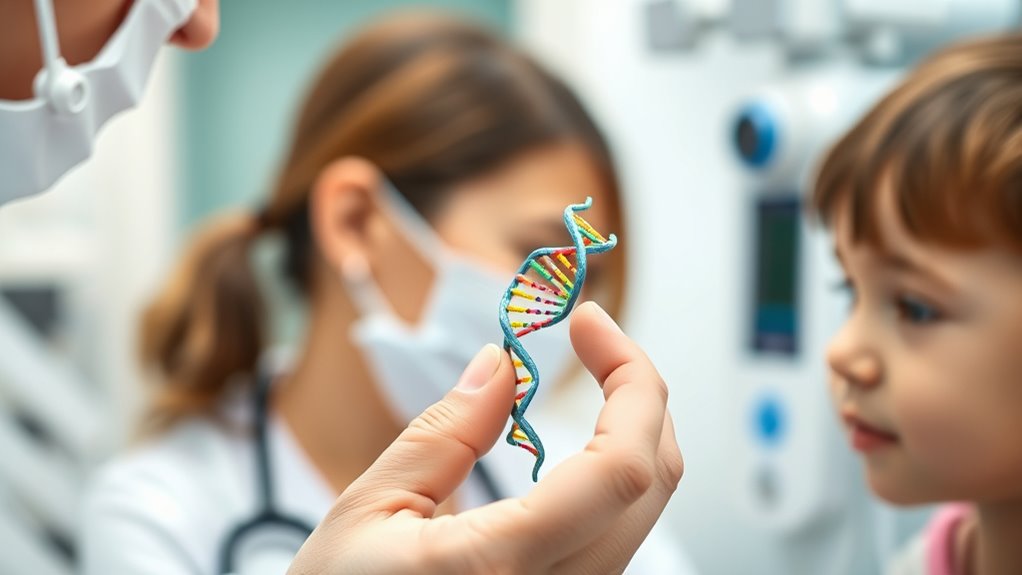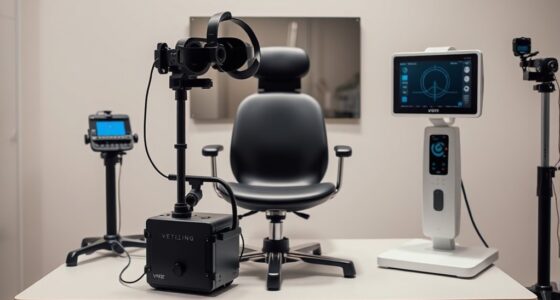Genetics play a key role in early hearing loss detection by helping you identify inherited risks before symptoms appear. Through genetic testing, you can discover mutations responsible for deafness syndromes, allowing for timely interventions like hearing aids or cochlear implants. Knowing your family’s genetic history helps assess your child’s risk and guides management decisions. If you want to understand how genetics can improve hearing loss detection and care, there’s more to explore below.
Key Takeaways
- Genetic testing identifies mutations linked to inherited deafness before symptoms appear.
- Family history guides risk assessment and prompts early genetic screening for hearing loss.
- Detecting genetic mutations allows for timely intervention, preventing speech and language delays.
- Genetic insights inform personalized management plans, including hearing aids or cochlear implants.
- Early genetic diagnosis supports reproductive decisions and comprehensive family counseling.

Genetics play a significant role in many types of hearing loss, influencing how and when it develops. Your genetic makeup can determine whether you’re at risk for certain hearing conditions, especially those caused by specific genetic mutation patterns. These patterns help scientists understand how mutations in particular genes contribute to hearing impairment, often revealing inherited deafness syndromes that run in families. Recognizing these patterns early can be essential for timely intervention and management. Digital literacy programs can also support families in understanding the importance of genetic testing and early detection.
Genetics influence hearing loss development and inheritance, guiding early diagnosis and intervention strategies.
Inherited deafness syndromes are a group of conditions passed down through generations, often from parents to children. When you carry certain genetic mutations, you might be predisposed to hearing loss that appears early in life or progresses over time. For example, some inherited syndromes are associated with specific mutations in genes like GJB2 or SLC26A4, which are common causes of congenital hearing loss. Knowing your family history and undergoing genetic testing can identify these mutations before symptoms become apparent, enabling earlier detection and treatment.
Understanding genetic mutation patterns allows healthcare providers to predict the likelihood of hearing loss in infants and young children. If there’s a history of deafness syndromes in your family, genetic screening can reveal whether you carry particular mutations linked to early hearing impairment. This proactive approach helps in planning interventions, such as hearing aids or cochlear implants, before significant speech and language delays occur. Furthermore, early detection based on genetic insights can guide you and your family through options for communication, education, and support.
Genetic testing has become an essential tool in the early detection of hearing loss because it offers precise information about the underlying causes. When you undergo genetic screening, your healthcare team can identify specific mutation patterns associated with inherited deafness syndromes. This knowledge not only clarifies the cause of hearing loss but also informs decisions about future risks and management strategies. In some cases, knowing your genetic profile can influence reproductive choices or alert you to potential health issues related to certain syndromes.
Frequently Asked Questions
Can Genetics Predict the Severity of Hearing Loss?
Genetics can give you clues about the potential severity of hearing loss, but it’s not a crystal ball. Variability in genes means some people might have mild issues, while others face more significant challenges. Environmental factors, like noise exposure or infections, also play a role. So, while genetic testing helps predict risks, it doesn’t definitively determine how severe your hearing loss will be, as multiple factors influence the outcome.
Are There Specific Genes Linked to Congenital Hearing Loss?
Imagine discovering a hidden message in your DNA—specific genes are indeed linked to congenital hearing loss. You should know that genetic mutations often follow inheritance patterns, making family history a key factor. Researchers have identified genes like GJB2 associated with this condition. Understanding these links helps in early diagnosis and intervention, much like finding a secret code that can change the future of those affected by congenital hearing loss.
How Accurate Are Genetic Tests for Hearing Loss?
Genetic tests for hearing loss are quite accurate, especially when using advanced screening methods that detect specific gene mutations linked to congenital deafness. These tests can identify at-risk individuals early, but their precision depends on the genes tested and the mutations included. While they provide valuable information, they may not catch all cases, so combining genetic screening with other assessments offers the best overall accuracy in early detection.
Can Genetic Information Guide Personalized Treatment Options?
Imagine uncovering genetic secrets that could revolutionize your treatment options. Yes, genetic information can guide personalized approaches, tailoring interventions to your unique DNA. But with this power come ethical questions—Genetic ethics—and considerations for family planning. Will you choose to share this knowledge? Your genetics might hold answers not just for you, but for future generations, shaping a new era of precision medicine and informed decisions in hearing health.
Is Genetic Counseling Recommended for Families With Hearing Loss History?
If your family has a history of hearing loss, genetic counseling is highly recommended. It helps you understand the risk assessment for your family and guides you on potential genetic factors involved. By discussing your family history, a counselor can identify possible inherited causes and suggest appropriate testing or interventions. This proactive approach guarantees you’re better prepared and can make informed decisions about your child’s hearing health.
Conclusion
By understanding the genetic factors behind early hearing loss, you can act swiftly—think of it as your own personal DeLorean, speeding you towards better outcomes. Early detection isn’t just a modern marvel; it’s a game-changer that lets you catch issues before they become a silent film. Embracing genetics means you’re stepping into the future of healthcare, where every discovery helps you stay one step ahead—like a true time traveler in a world of sound.










